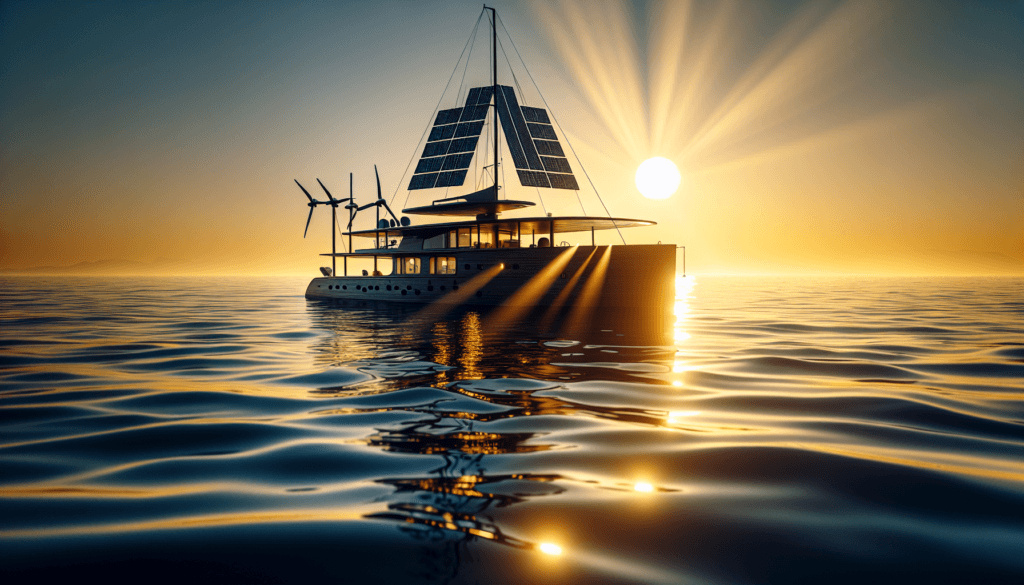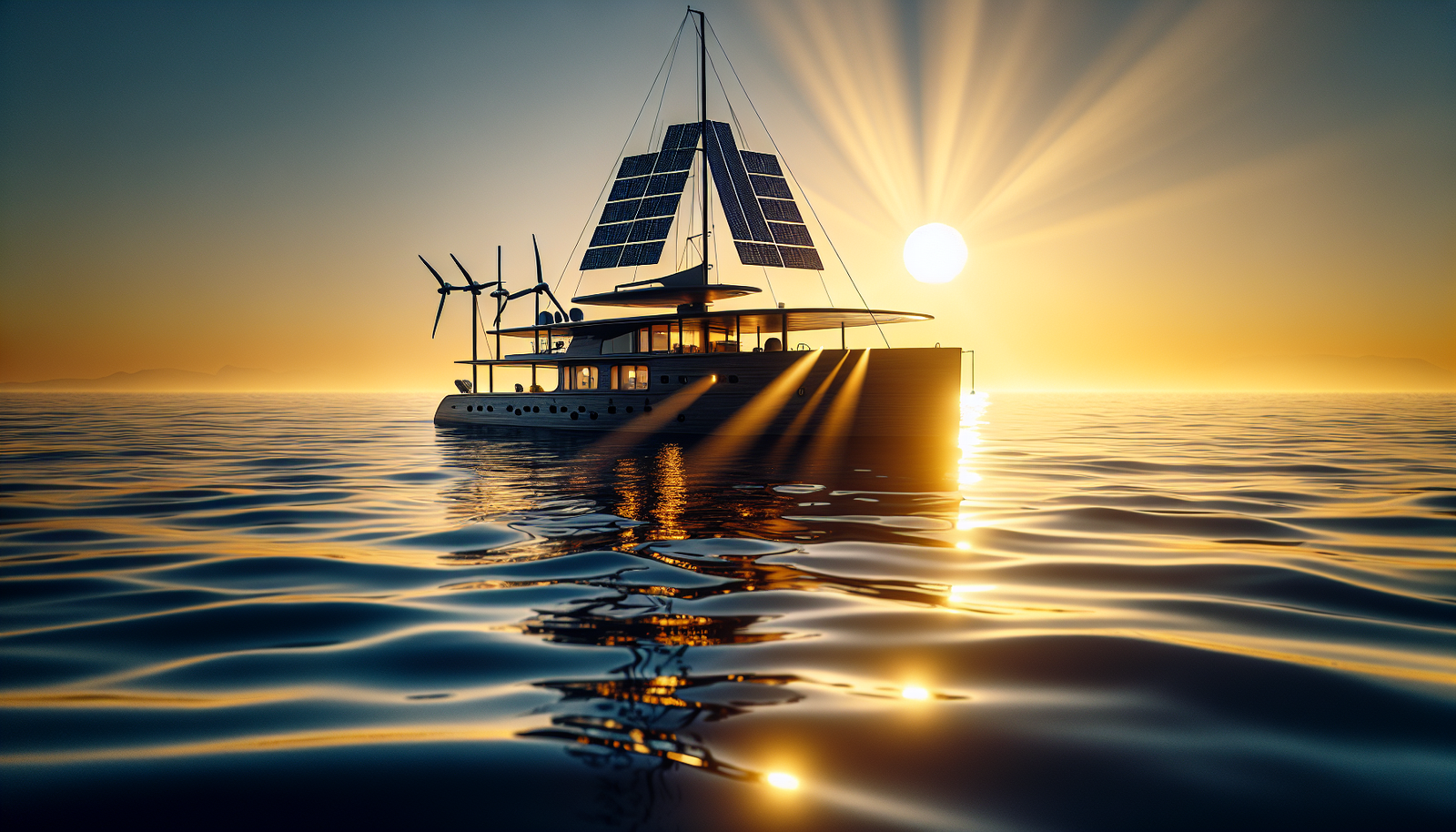Imagine a bright sunny day, a gentle breeze flowing through your hair, and the tranquil sound of waves as you embark on a serene boat ride. The article named “Promoting Environmental Stewardship In Boating” accentuates the growing need for conservation efforts within the maritime industry. It elaborates on how your love for the open sea and boating can be merged with responsible environmental stewardship, thus creating a sustainable foundation for future generations. From eco-friendly boating practices to the importance of safeguarding marine biodiversity, this enlightening piece is a clarion call urging you to play an active role in preserving our precious oceans.

Understanding Environmental Stewardship
Environmental stewardship is all about preserving and taking care of our natural surroundings. It involves managing and protecting the environment through replenishing resources that we use and ensuring that we don’t harm wildlife, landscapes, and ecosystems. As environmental stewards, every choice we make can have an impact on the planet, from the products we purchase to the activities we engage in.
Definition of environmental stewardship
At its core, environmental stewardship is about responsibility. It’s about understanding that you are a part of the environment, not something separate or distant from it. With this realization comes a duty to care for and manage our natural resources in a way that their benefits can be enjoyed by future generations.
Importance of environmental stewardship in preserving natural resources
The reason environmental stewardship is so critical is that our natural resources are finite. Once they are exhausted, they can’t be replaced. Environmental stewardship is about understanding this limit and doing our part to slow the consumption of these resources. It’s about making sustainable choices that allow for restoration and renewal of these resources.
Role of individuals in promoting environmental stewardship
Each one of us has an important role to play in promoting environmental stewardship. You can do this by making conscious choices in your daily habits, like recycling or choosing energy-efficient appliances. We can also be advocates for the environment by pushing for policies and practices that are sustainable and environmentally friendly.
Highlighting the Environmental Impact of Boating
Boating, while a popular leisure activity, has some serious environmental implications if not managed responsibly.
Effects of boating on water quality
Boating can significantly impact water quality. For instance, fuel leaks and oil spills from boats are harmful to aquatic life and can degrade the quality of water. Additionally, pollution from boat cleaning agents can also seep into the water, causing further damage.
Impact of boating on marine life
Boats can also have a destructive impact on marine life. The propellers of speeding boats can injure or kill marine mammals and disrupt marine habitats. Moreover, increased boat traffic in certain areas can disturb the natural behaviors of marine species.
Boating waste management issues
Another aspect is waste management. Many boats are not equipped with appropriate waste storage and disposal systems. As a result, waste ends up being dumped directly into the sea, causing pollution and harm to aquatic life.
Noise pollution due to boating
Boating is also contributing to noise pollution underwater. The constant humming of boat engines can interrupt communication among marine species, affecting their ability to find food or mates and avoid predators.
Regulations and Policies Governing Environmental Stewardship in Boating
There are several laws and regulations in place to minimize the environmental impact of boating.
Understanding marine environmental laws and regulations
Marine environmental laws and regulations are designed to protect the delicate balance of marine ecosystems. These laws control activities such as waste disposal, fishing practices, and vessel traffic, to minimize the impact of these activities on marine life and habitats.
Role of government in promoting sustainable boating practices
The government plays a critical role in enforcing these laws and promoting sustainable boating practices. They can implement policies that encourage manufacturers to design eco-friendly boats, educate boaters about green boating practices, and incentivize boaters to adopt these practices.
Consequences of non-compliance with marine environmental policies
Non-compliance with marine environmental policies can result in significant consequences. These can range from fines to revocation of boating licenses, and in serious cases, criminal charges.

Practices to Limit the Environmental Impact of Boating
Adopting sustainable practices in boating is critical to reducing its environmental impact.
Use of eco-friendly boat design and materials
Eco-friendly boat designs and materials can significantly lessen the environmental impact. These include using renewable materials for building boats, using designs that minimize fuel consumption, and incorporating features that facilitate proper waste management.
Reducing fuel consumption and emissions
Reducing fuel consumption and emissions from boats is another crucial practice. This can be achieved by maintaining boat engines in good condition, using efficient propellers, and being mindful of boat speed to reduce fuel burn.
Proper waste management onboard
Practicing proper waste management onboard can greatly contribute to the preservation of marine life. This involves proper segregation of waste, using environmentally friendly products, and ensuring waste is disposed of at designated facilities.
Limiting noise and light pollution
Limiting noise and light pollution is also important. Boat owners can do this by using quieter engines, limiting boat operations at night, and using light fixtures that direct light downward to minimize light pollution.
Technologies Promoting Sustainable Boating
Technology plays a crucial role in promoting sustainable boating.
Role of technology in sustainable boating
Technology provides solutions that can make boating more environmentally friendly. Innovations in boat designs, engines, and materials are paving the way for sustainable boating.
Innovations in marine engines and fuels
Innovations in marine engines and fuels have resulted in cleaner and more efficient boat operation. For example, electric and hybrid engines produce fewer emissions compared to traditional engines, while biofuels and synthetic fuels offer a more sustainable alternative to fossil fuels.
Technology for effective onboard waste management
Advancements in waste management technology have also made it easier for boaters to manage waste appropriately. Compact and energy-efficient waste treatment systems are now available, making it feasible to treat waste onboard and avoid dumping it into the sea.
Use of renewable energy in boating
Renewable energy technologies like solar and wind power are also being incorporated into boat design. These technologies provide a cleaner source of energy for boat operations and reduce reliance on fossil fuels.
Education and Training for Boaters
Education and training are vital in bringing about a change in boating habits.
Importance of boater education on environmental responsibility
Education plays a crucial role in promoting environmental responsibility among boaters. Educated boaters are more aware of the impact of their actions on the environment and are better equipped to make sustainable choices.
Training and certification programs for boaters
Training and certification programs are important tools for educating boaters about responsible practices. These programs provide practical knowledge and skills needed to minimize the environmental impact of boating.
Inculcating responsible boating habits
Education and training also play an important role in inculcating responsible boating habits among boaters. This includes adopting sustainable practices like reducing waste, minimizing noise, and limiting boat speed to protect marine life.
Role of boating clubs and associations in education and training
Boating clubs and associations can play an active role in promoting education and training among boaters. They can organize workshops, seminars, or courses that educate their members about the importance and benefits of green boating.
The Role of Boat Manufacturers in Promoting Environmental Stewardship
Boat manufacturers have a great deal of influence in promoting environmental stewardship in the boating sector.
Adopting sustainable manufacturing practices
Manufacturers can make a big difference by adopting sustainable manufacturing practices. This means choosing environmentally friendly materials, reducing waste in production, and designing boats that are energy-efficient and low-impact.
Designing boats with minimal environmental impact
Boat manufacturers also play a role in designing boats that have minimal environmental impact. They can achieve this by making boats that are fuel-efficient, easy to maintain, and built with eco-friendly materials.
Creating accountability among boat manufacturers
Manufacturers must also be held accountable for their environmental impact. This means being transparent about their manufacturing processes, usage of materials, and willingness to adopt green practices.
Engaging Communities in Promoting Environmental Stewardship in Boating
Community engagement is critical in promoting environmental stewardship in boating.
Community-led initiatives for sustainable boating
Community-led initiatives are an effective way of encouraging sustainable boating. These initiatives can involve beach clean-ups, education campaigns, or boating events with a focus on sustainability.
Involving local government and authorities
Involving local government and authorities can help to support and regulate these initiatives. They can provide resources, enforce regulations, and promote sustainable practices among the local boating community.
Promoting a culture of responsibility among boating communities
Creating a sense of responsibility among boaters is key to promoting environmental stewardship. If every boater understands their role in protecting the environment, we can see a significant change in boating practices towards sustainability.
Case Studies of Successful Environmental Stewardship in Boating
There are many success stories of environmental stewardship in boating that can serve as inspiration and guide for others.
Examples of successful green boating initiatives
There are various examples of successful green boating initiatives worldwide. These range from boating clubs implementing strict environmental policies, manufacturers launching eco-friendly boats, to communities embracing sustainable boating practices.
Lessons learned from successful cases
These case studies provide valuable lessons. They demonstrate the importance of community involvement, government support, education, and the use of technology in promoting environmental stewardship in boating.
Efforts to replicate successful case studies globally
Efforts are underway to replicate these successful cases in other regions and countries. By sharing their stories and lessons, these successful initiatives can inspire others to adopt similar green boating practices.
Measuring the Impact of Environmental Stewardship Efforts in Boating
To ensure the success of environmental stewardship efforts in boating, it’s important to measure their impact.
Techniques to measure the impact of sustainable boating practices
There are various techniques to measure the impact of sustainable boating practices. This can involve environmental audits, surveys, or monitoring of key indicators like waste levels, fuel consumption, or biodiversity in areas frequented by boats.
Impact of regulations on boating practices
Regulations can have a significant impact on boating practices. This can be measured by changes in boating behavior, compliance levels, or the environmental health of marine ecosystems in areas with stringent boating regulations.
Assessing social acceptance of environmental stewardship in boating
Social acceptance is a crucial aspect of environmental stewardship. Surveys and community feedback can provide insights into how well sustainable boating practices are being accepted and adopted by the boating community.
In conclusion, environmental stewardship in boating is critical for the preservation of marine environments. With a combination of education, technology, regulations, and community engagement, we can significantly reduce the environmental impact of boating and ensure that our oceans remain healthy for future generations.

